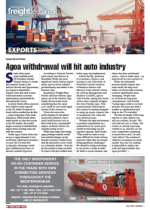South Africa must tread carefully amid US President Donald Trump’s threats to revoke the country’s access to the African Growth and Opportunity Act (Agoa) in September. Experts warn that such a move could have severe economic repercussions, particularly for the automotive sector.In 2024, South Africa exported $14.7 billion worth of goods to the US, while US exports to South Africa totalled just $5.8bn – a clear indication of the trade imbalance. While South Africa relies heavily on duty-free access to the US market, the world’s largest economy would feel little impact from severing trade ties with the country.Under Agoa, South Africa has access to approximately 6 800 tariff lines, allowing its products to enter the US duty-free. Losing this advantage would place additional pressure on already strained exporters.According to Francois Fouché, trade expert and director at Boundless World, the most significant South African export under Agoa is motor vehicles – predominantly assembled in the Eastern Cape.Speaking to Freight News, Fouché said that without Agoa export out of the Eastern Cape simply did not make sense, considering that the usual 2.5% tariff on cars would apply instead of the current 0%.“Given the razor-thin profit margins in the global automotive industry, even a small tariff increase such as this would have a meaningful impact on South Africa’s car manufacturing sector.”While some argue that losing Agoa privileges entirely would have minimal impact on the broader economy, Fouché warns that the automotive sector could see a dramatic decline – from the $1.9bn annual revenue recorded in 2022 to the $195 million level before Agoa was implemented. Adrian Saville, professor of economics, finance, and strategy at the University of Pretoria’s Gordon Institute of Business Science and director of the school’s Centre for African Management and Markets (CAMM), agrees with Fouché, saying that South Africa must urgently mitigate the risk of losing Agoa. This is particularly critical given the country’s existing struggles to ramp up export capacity due to inadequate rail, road and port infrastructure.“Without the right environment to produce competitively at a national level, we cannot grow wealth by increasing our net exporter capacity,” said Fouché. “Why would we make it even more difficult for South African exporters when they are already facing significant challenges? We should be doing everything in our power to make it easier for them to access markets, and where they have preferential access – such as under Agoa – we must do all we can to protect it.”While the immediate macroeconomic impact may seem small, the long-term effects on the broader economy could be significantly more damaging. “People tend to overlook the long-term consequences,” said Fouché. “Losing Agoa could set us back decades. You don’t just find a market as sophisticated and deep as the US overnight.”The idea of simply redirecting exports to other regions was also not realistic, he said. “We can’t sell our cars to China. The country is already exporting vehicles to us, and they are far more competitive, producing at much lower costs,” he said. “And Africa? The continent’s collective economies are much smaller than the US, making it impossible to replace the scale and opportunities that Agoa provides.” LV

